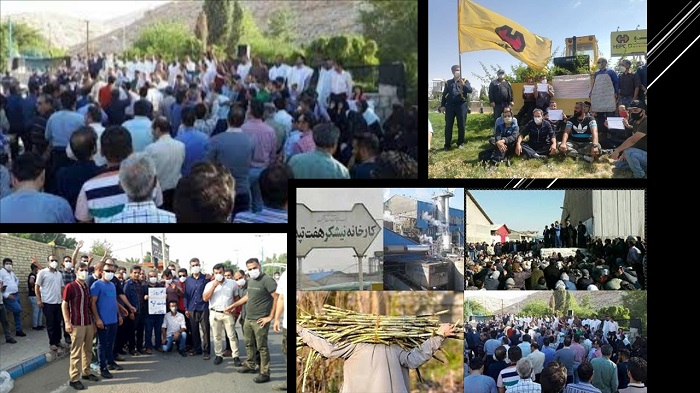
MEK Iran: Employees of Gas, Oil Petrochemical Industry Take part in strikes in numerous cities.
Delays in paying wages have led to employees of Iran’s oil, gas and petrochemical industry to take part in strikes in numerous cities throughout southern Iran on Saturday. They are also demanding pension entitlements.
In the last few days, the cities affected included Asaluyeh, Abadan, Kangan, and Qesh.
Employees & workers of Iran's oil, gas & petrochemical industry launched strikes in numerous cities checkered across southern Iran, protesting paycheck delays & demanding the pensions that they have been denied for a long time now.#Iran#IranProtestshttps://t.co/EeOetMPChN
— People's Mojahedin Organization of Iran (PMOI/MEK) (@Mojahedineng) August 2, 2020
Dates and events that took place
- On August 2nd in Kangan workers of the South Pars gas project went on strike to demand their unpaid wages.
- On August 2nd in Asaluyeh workers of Phase 14 (South Pars natural gas project) have taken part in strikes.
- On August 2 in Abadan workers in the Abadan refinery continued their strike protesting against low wages.
There were also strikes in the refineries in the following provinces:
- Abadan and Mahshahr in Khuzestan province, southwest Iran;
- the heavy crude oil refinery of Qeshm in Hormozgan province, southern Iran;
- the Parsian petrochemical refinery in the city of Lamerd, Fars province, in south-central Iran;
- phases 22 and 24 of the South Pars gas project in the town of Kangan, Bushehr province, also in southern Iran;
- the South Pars gas project (Phase 22/24) demanding their delayed paychecks.
These workers have a number of reasons for protesting which include extreme working conditions, insufficient basic safety equipment and not receiving their paychecks and pensions for many months.
Last Wednesday, employees at the North Azadegan oil field were on strike, protesting against low wages. This strike started when the executive director of the Azadegan oil field forced a large number of employees and workers off the site. In addition, workers at the Abadan refinery are on strike for not getting their paychecks and pensions.
Iranian opposition President Maryam Rajavi, head of the National Council of Resistance of Iran’s (NCRI) Statement
She supported wholeheartedly the workers protesting in Abadan, Qeshm, Parsian, Lamerd, Mahshahr, and South Pars. She highlighted that oppressed workers have the right to demand their wages and pensions which have been withheld for far too long.
She tweeted: “Hail to the workers of refineries in Abadan, Qeshm, Parsian, and Lamerd who have launched a strike to gain their rights. #Iran’s oppressed workers are using strikes and protest to restore Iranian workers’ rights plundered by the mullahs’ inhuman regime,”
Hail to the courageous workers of HEPCO who went on strike and the people of Arak who supported them.I urge international labor organizations to condemn the clerical regime’s repressive policies against Iranian workers and support the demands of HEPCO workers#Iran#Iranprotests
— Maryam Rajavi (@Maryam_Rajavi) February 5, 2018
Sugarcane strike
https://twitter.com/HeshmatAlavi/status/1289495062913589248
In other protests in Iran, the workers of the Haft Tappeh Sugarcane Company have continued with their strike and held a Sunday rally outside the local governor’s office. The workers want their delayed paychecks as well as the renewal of their medical insurance booklets which have expired. It has now been 49 days since the start of the Haft Tappeh Sugarcane Company strike. The protest is due to delayed paychecks.
HEPCO strike
More images from today's HEPCO workers protest in the western province of Arak, #Iran. #IranProtests pic.twitter.com/covrdAveKB
— Iran News Wire (@IranNW) September 16, 2019
In Arak, central Iran, employees of the HEPCO heavy machinery factory took part in a large gathering for the second day in a row on Sunday. They are seeking better job security and want the pay paid that they are owed.
Last Saturday, Nourabad locals in Lorestan province, western Iran, gathered outside the mayor’s office with a banner which read, “We the residents of Baharestan, Taleghani, Koshtargah, Shahrake Basij and Kuye Soleimani districts demand standard streets for our town and neighborhoods.”
No one should have to strike because the condition of their streets is so bad but because there is so much corruption when handling money by the regime key projects never take place.
July 25 – Shush, southwest #Iran
Employees of the Haft Tappeh Sugarcane Company are protesting & on a strike for the 41st consecutive day, demanding delayed paychecks and answers to other outstanding issues raised with company officials.#IranProtests pic.twitter.com/tSFuYz1juH— People's Mojahedin Organization of Iran (PMOI/MEK) (@Mojahedineng) July 25, 2020
The Mullahs regime has responded to the protests at Haft Tappeh with a suppressive force. Since 2018, a dozen of the arrested protesters have been tortured and forced to make false confessions on state television. The People’s Mojahedin Organization of Iran (PMOI / MEK Iran) previously reported that forced confessions are a common tactic employed by the regime.
Officials of the mullahs’ regime are now warning of even greater protests and uprisings on the horizon, especially because of the failure to properly deal with the Coronavirus outbreak in Iran which has already killed over 81,000 people. According to MEK.
The MEK is not just an alternative to the mullah’s regime in waiting. It represents a very real threat to the regime and the potential for the mullahs’ regime to be overthrown and replaced with a free, secular, democratic government.
